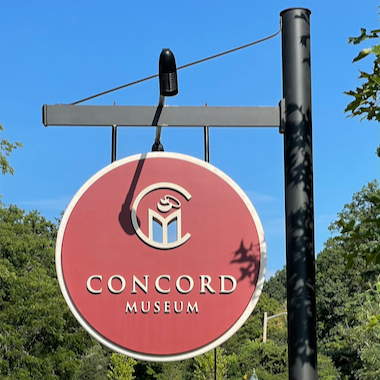The Concord Museum houses one of the oldest and most treasured collections of Americana in the country. It educates visitors of all ages about the history of Concord, Massachusetts and its continuing influence on American political, literary, and cultural life. The Museum’s nationally significant collection serves as a catalyst for changing exhibitions, extended classroom learning, dynamic programs and publications relevant to an ever-changing world. Founded in 1886 as the Concord Antiquarian Society, the Museum is a center of cultural enjoyment for the region and a gateway to the Town of Concord for visitors from around the world.
Collection highlights include Ralph Waldo Emerson’s study, Henry David Thoreau’s desk, spyglass, and show shoes, and one of the lanterns hung from Old North Church on the night of Paul Revere’s ride. Three new permanent galleries chronicling the events of April 19, 1775 and their revolutionary effect on American history have opened.
Following In Thoreau’s Footsteps
The Concord Museum is home to the world’s largest collection of objects related to Henry David Thoreau—more than 250 items in all. These include the green pine desk he bought at age 21 and kept for the rest of his life, using it when he wrote all his books and essays. The desk was in his house at Walden Pond, where he lived in 1845-47, and the Museum’s exhibit also includes a bed and chair from his Walden house.
Visitors can see things that Thoreau made himself, including a walking stick notched to measure the depth of snow (he called himself a “self -appointed inspector of snowstorms”); a box to store and display geological specimens, made for his friend Ellen Sewall (Osgood); and an Aeolian harp, an instrument that makes music when the wind blows across its strings. There are books Thoreau wrote (such as A Week on the Concord and Merrimack Rivers), books he read (such as The Bhagavad-Gita), and rare photographs, including an Ambrotype of Thoreau taken in 1862, the year of his death, and a Daguerreotype of his sister Sophia taken in the 1850s. Due to the fragile nature of works on paper, these objects are not always on display.
Tools that Thoreau used as a land surveyor are on display, as is a flute he enjoyed playing. In Maine, Thoreau purchased a Mi’kmaq porcupine-quill box that can be seen in the Museum, as well as a pair of Penobscot snowshoes that visitors can see in photographs.
Two highlights of the Museum’s Thoreau collection are related to his antislavery activism. One is the lock and key from the jail where Thoreau was locked up in 1846 for his antislavery tax protest. (He was only jailed for one night, but the experience inspired the essay we know as “Civil Disobedience.”) The other is a ceramic figurine depicting the characters Uncle Tom and Little Eva from the 1852 novel Uncle Tom’s Cabin. This item is believed to be a gift given to the Thoreau family in gratitude for helping a refugee from enslavement escape to Canada. The Museum’s exhibit also features a video by Thoreau biographer Laura Dassow Walls.
The Concord Museum has grown since it was built in 1930 on land donated by Ralph Waldo Emerson’s family. Visitors can now experience not only the Thoreau collection, but the stories of Concord’s other literary figures, its indigenous people, notable African Americans of Concord, and the “shot heard ’round the world” on the first day of the American Revolution.

